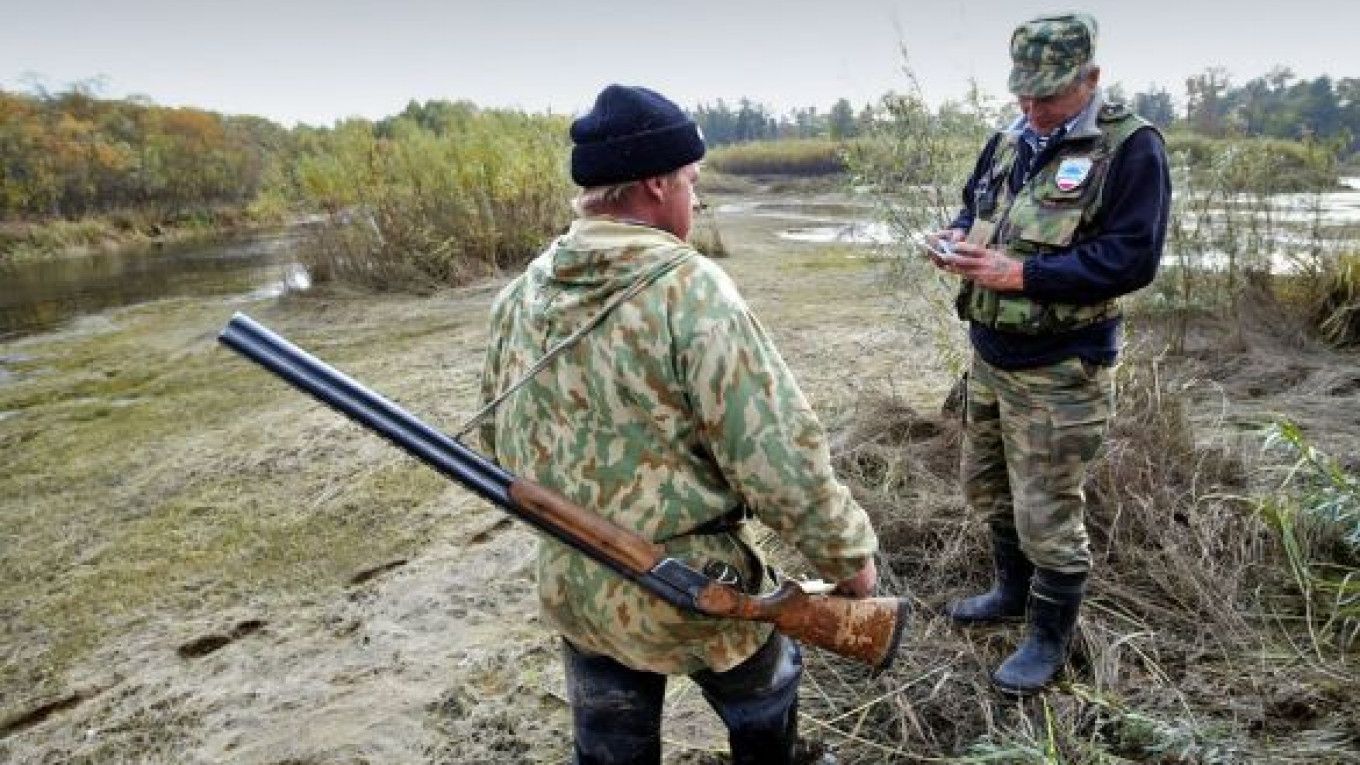If you have a polar bear skin in your house, get rid of it.
As Russia toughens its hunting laws, this is the advice from Natural Resources and Environment Minister Sergei Donskoi.
According to the changes, hunters of animals included in the country's Red Book list of endangered species or those protected by international agreements will not only get large fines, but face criminal charges.
Punishments will also be meted out to those who trade, transport, sell or buy the animals or parts of them.
"In essence, [this legislation] knocks out the economic basis for poaching. The trade in Red Book species is one of the most profitable lines of business that exists today," Donskoi said. "Our aim is to fundamentally change the [commercial] dynamic in this sphere."
Poaching is on the rise, said Andrei Sitsko, deputy director of the Natural Resources and Environment Ministry's hunting department. There were 17,000 hunting violations recorded in 2008, and more than 45,000 last year, according to the ministry's data.
Thirty to 50 Amur tigers are killed each year. The Natural Resources and Environment Ministry, which assigns a monetary value to the loss of various species, estimates the cost of this at up to 25 million rubles ($764,000). The World Wildlife Fund estimates there to be 450 such tigers left in the country.
More than 1,000 merlin, saker and peregrine falcons are also lost yearly, at an estimated cost of 240 million rubles.
Russian law previously prescribed only administrative punishments for poachers and those involved in the illegal hunting trade.
Now, the hunter who bags an Amur tiger could get a fine of 1 million rubles and five to seven years in jail. Fines and prison terms for the organizers of hunting expeditions would be even higher.
Officials are now finalizing which animals will receive special protection alongside endangered species.
Other, as yet unapproved, legislation would delegate more authority to gamekeepers — currently not able to even request to see a hunter's documents. The new law would empower gamekeepers to demand hunting and weapons licenses, inspect hunters' cars and belongings and submit video and photo footage to the law enforcement agencies.
"People who are responsible for wildlife in hunting areas did not have any special rights until now," said Vladimir Lebedev, deputy environment minister. "Imagine this situation: There is a poacher. He meets a gamekeeper who asks him, 'what are you doing here?' And he says, 'I do whatever I want.' This was the typical situation over the last 10 years."
There are now about 2,000 gamekeepers in Russia, but this number should increase to 30,000 after the law comes into force, which is expected at the start of the new hunting season in August.
But hunters said they are worried about clashing with gamekeepers.
"Social tensions are already so high that the adoption of such a law will cause even more bitterness against the government," said Andrei Ovchinnikov, a hobby hunter from the Nizhny Novgorod region.
He added that he avoids gamekeepers when he can because they try to find causes for blame even when there are none.
Perhaps as a step toward law-abiding hunters, the Natural Resources and Environment Ministry is proposing to lessen the punishment for small hunting infractions. Sitsko said the range of fines for these kind of misdemeanors would be brought down from between 2,000 and 5,000 rubles to between 500 and 4,000 rubles.
Contact the author at e.smirnova@imedia.ru
A Message from The Moscow Times:
Dear readers,
We are facing unprecedented challenges. Russia's Prosecutor General's Office has designated The Moscow Times as an "undesirable" organization, criminalizing our work and putting our staff at risk of prosecution. This follows our earlier unjust labeling as a "foreign agent."
These actions are direct attempts to silence independent journalism in Russia. The authorities claim our work "discredits the decisions of the Russian leadership." We see things differently: we strive to provide accurate, unbiased reporting on Russia.
We, the journalists of The Moscow Times, refuse to be silenced. But to continue our work, we need your help.
Your support, no matter how small, makes a world of difference. If you can, please support us monthly starting from just $2. It's quick to set up, and every contribution makes a significant impact.
By supporting The Moscow Times, you're defending open, independent journalism in the face of repression. Thank you for standing with us.
Remind me later.






